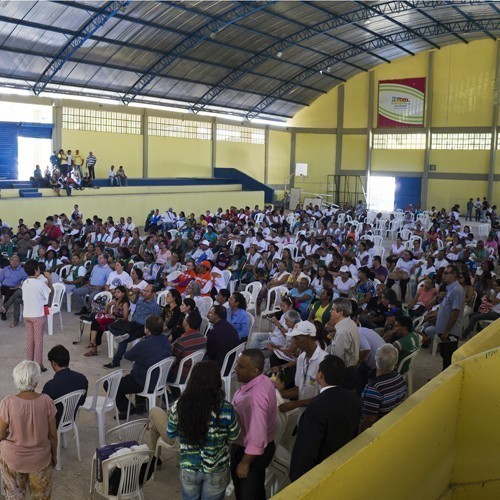
©Anizio Silva, 2015. Officials meet at the Olympic Village Rio Doce to discuss emergency plans for addressing Aedes aegypti mosquitoes, known to transmit the Zika virus.
Last We Knew: The World Health Organization declared Zika an international public health emergency in February, following a large-scale outbreak that has infected millions in Brazil.
The 2015 outbreak helped doctors discover a link between the virus and microcephaly, a potentially deadly birth defect that causes babies to be born with abnormally small heads and underdeveloped brains. They also found strong evidence that Zika might trigger Guillain-Barré syndrome.
While symptoms of the mosquito-borne disease are mild in most cases—including a slight fever, rash, and possible muscle aches and conjunctivitis—the implications for pregnant women who contract the virus had the WHO calling for increased disease surveillance and efforts to find a vaccine. The organization stopped short of issuing recommendations to limit travel and trade, however—including those pertaining to the upcoming 2016 Olympic Games in Rio de Janeiro.
The Latest: A group of prominent international health experts issued an open letter to the WHO on Friday, suggesting that the organization should reconsider the stance that the Olympics should not be moved or postponed.
“An unnecessary risk is posed when 500,000 foreign tourists from all countries attend the Games, potentially acquire that strain, and return home to places where it can become endemic,” the letter states. “Should that happen to poor, as yet unaffected places (e.g., most of South Asia and Africa) the suffering can be great. It is unethical to run the risk, just for Games that could proceed anyway, if postponed and/or moved.”
The authors cite seven factors that they say the WHO should be considering, including Rio’s high infection rate and its inability to effectively control the mosquitos that carry the disease. The letter, which was signed by 150 experts in more than a dozen countries, also insinuated that an undisclosed partnership between the WHO and the International Olympic Committee might be affecting the current WHO recommendations.
"We are [writing the letter] to ask for an open, transparent discussion of the risks of holding the Olympics as planned in Brazil," Arthur Caplan, a bioethicist at New York University and one of the letter's authors wrote in an e-mail to the Washington Post. "If Rio is going to happen, the world deserves a full discussion of why and at what potential risks and liabilities.”
Coming Up: The WHO had not immediately responded to the letter on Friday, although the IOC stated that they would “always consult the WHO for guidance and advice on health matters,” according to The Guardian.
Past calls for moving or postponing the Games have been answered with speculation that Zika transmission during the event—held in the cool, dry months of August and September—is likely to be low.
Numerous national health agencies statements, including one from the director of the Centers for Disease Control and Prevention, indicate that Zika at the Olympics shouldn’t be of high concern for anyone who isn’t pregnant (although opponents of that stance point out that men can contract and sexually transmit the disease, as well). Such assurances, although comforting and possibly accurate, can’t be wholly substantiated, according to the authors of the letter.
“Because Zika is a new emergency, its many uncertainties—of travel flows during the Games, of epidemiology, and of entomology—currently make it impossible for mathematical models to predict the epidemic’s course accurately,” they write. “Therefore, for now, any decision about Zika and the Games has to be more qualitative than quantitative.”
Jolie Breeden is the lead editor and science communicator for Natural Hazards Center publications. She writes and edits for Research Counts; the Quick Response, Mitigation Matters, Public Health, and Weather Ready Research Award report series; as well as for special projects and publications. Breeden graduated summa cum laude from the University of Colorado Boulder with a bachelor’s degree in journalism.